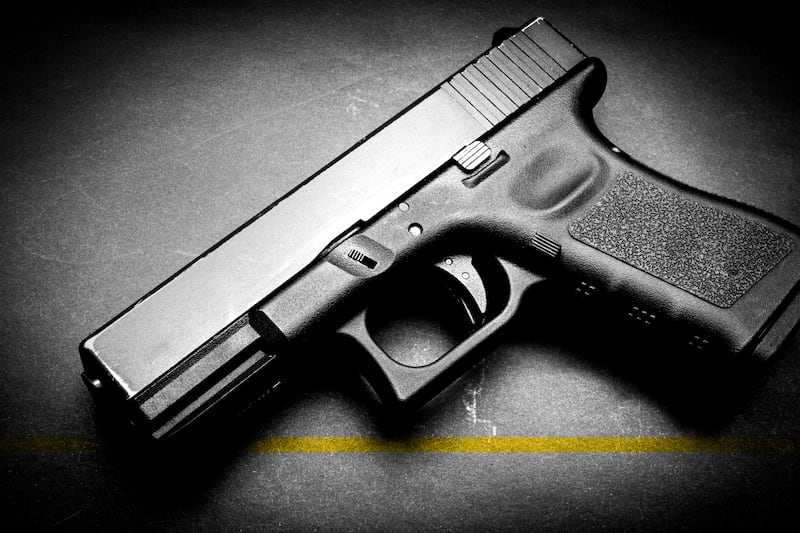SALT LAKE CITY — From universal background checks to red-flag laws to asserting state control over weapons rules, legislators filed bills throughout the session targeting both sides of the gun rights vs. gun control debate.
But in the end, the Senate refused to pull the trigger.
“There’s a lot of gun bills this year. Depending on which side of the equation you are on some could be considered good and some could be considered bad,” Senate Majority Leader Evan Vickers, R-Cedar City, said on the final day of the 2020 legislative session Thursday. “We have an awful lot of important policy decisions to go through, we felt like at least at this point we cannot try and hear all types of gun bills.”
Rep. Cory Maloy, R-Lehi, a staunch Second Amendment supporter, didn’t agree with the tactic.
“I think we sent some good bills over to the Senate and they are just ignoring them, and honestly it doesn’t make me happy at all. It makes me wonder where the Senate’s heads are,” Maloy said as the session neared its end last week. “I don’t know why they would put up a roadblock.”
The Utah Senate did not consider any gun bills on the last days of the session, instead holding legislation from both Republican and Democrat sponsors — a decision that prompted some frustration and confusion from stakeholders and lawmakers.
“We felt like it was an important decision to maybe ruminate on those a bit more, spend some more time on them and possibly consider those next year and next session,” Vickers said.
He explained that the governor has input on those bills, like whether he would consider vetoing them or not, all of which “comes into play.”
Some of the proposals found widespread bipartisan support. On more controversial bills, guns rights and gun control activists pooled into the Capitol to speak during committees hearings, rally, and share personal stories with lawmakers in hopes of swaying them one way or the other.
Maloy had two bills related to guns held on the Senate’s side — one of which would have strengthened the state’s authority to regulate firearms, preventing cities and counties from enacting restrictions. The other would have allowed Utahns to voluntarily put themself on a firearm no-buy list for a temporary period of time.
Maloy’s priority was the preemption bill, HB271, which cleared the House on a party line vote 55-15 on Feb.28.
“The preemption bill strengthens the wording of that law so its very, very clear that the state has full authority to regulate firearms,” he said, pointing to Salt Lake County’s recent decision to require vendors at gun shows in county facilities to run background checks as an example of what the bill would override. “To me, it’s a very timely bill.”
Maloy plans to work on it over interim to bring it back next session.
The other, HB82, would allow a person to voluntarily sign up with the Bureau of Criminal Identification to be restricted from buying a firearm from a retail store for a short span of time. It passed in the House unanimously.
Two other gun bills that found bipartisan support in the House, but were held in the Senate came from Democratic representatives.
HB316, which the House passed unanimously March 5, would have provided notification requirements for an individual unable to possess a firearm because of a criminal conviction.
The other, HB267, would have provided a process for surrendering a firearm after an individual becomes a restricted person. It passed from the House with just three dissenting votes on Feb. 25.
A couple of other bills could not even make it into committees for hearings.
Rep. Steve Handy, R-Layton, tried for a third time to enable a family member or someone from law enforcement to request that the court strip a firearm from a person in crisis, a so-called “red-flag law.” He gave up on HB229 early in the session. He said then that there is a great deal of data showing the effectiveness an extreme risk protection order.
Sen. Daniel Thatcher, R-West Valley City, introduced a bill pertaining to guns, but emphasized SB87 was not a red flag bill. Thatcher, who opposes extreme risk protection orders, said his legislation would make a “simple” change to an existing system and wouldn’t “infringe on someone’s constitutional right.” It also did not go anywhere.
House Minority Leader Rep. Brian King, D-Salt Lake City, expressed frustration that the Senate took a “one-size fits all” approach not to hear any gun bills, especially considering the noncontroversial bills like his and Rep. Andrew Stoddard’s found bipartisan support.
“This is going to keep people safe from suicide and homicide — these two bills (HB316 and HB267) passed the House floor with a total of three votes against them between the two of them,” King said. “I look at those and think what’s not to like?”
He said he feels it sends a disheartening message to put blinders up without “careful analysis or regard for substance of the bills.”
“I think we can do a much better job in the interest of everyone regardless of where you are on the scale or the spectrum of feeling about the Second Amendment of passing good legislation that has broad consensus from all camps,” King said.
Clark Aposhian, Utah Shooting Sports Council chairman, also expressed frustrations.
“Utah Shooting Sports Council is disappointed in the Utah Senate’s decision to hold all firearm related legislation. The issues will not simply disappear because they denied discussion and collaboration,” he said. “We will continue to work our issues over the interim.”
Contributing: Katie McKellar


